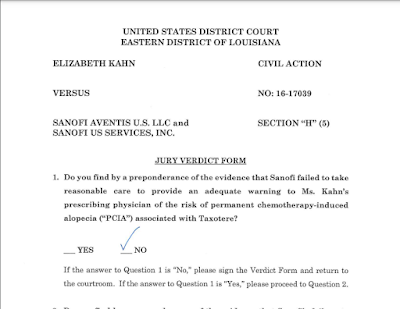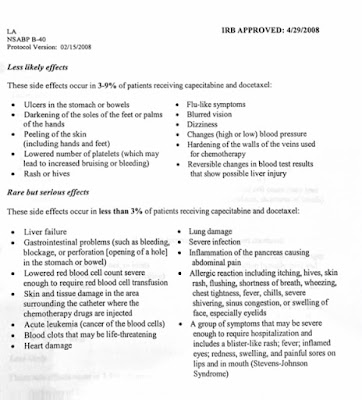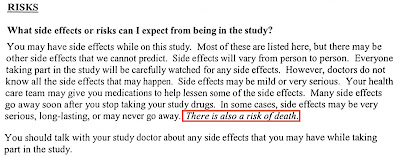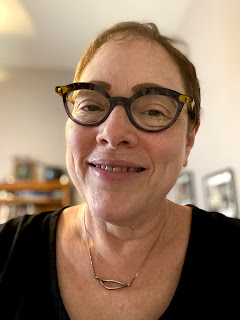Photo taken June 2021
It has been over 10 years since I last posted on this blog. I really had no intention of ever adding another post, but something changed about my cancer treatment in 2016 that I could not discuss until now. In 2016, I learned from a television ad that my hair loss could have been caused by one of the chemo drugs that I took in 2008. Taxotere is from the pharmaceutical company Sanofi. Sanofi has known since at least 2006 that this drto cause permanent hair loss to women who took it for early stage breast cancer. However, the label in 2008 only mentions that hair loss may occur from taking the drug, which in my mind meant temporary, not permanent. There is the crux of the lawsuit, a journey that I began in November of 2016 and ended in federal court on November 18, 2021. I wasn't told by anyone at any time --doctors, nurses, or Sanofi-that my hair might not grow back after I finished chemo treatment. When my hair did not fill in after treatment ended, I really did not know why. I asked three different doctors about this. My gynecologist told me it was the aging process, and at that time, I was 50 years old. I knew that women's hair might thin over time as they aged, but I didn't know that balding was the usual issue with age and hair. I won't leave you hanging--it is nearly impossible to fight a multi-billion dollar drug company and win. It can be done, and my lawyers have done it in other cases, but my case was extremely difficult. The jury was just not convinced by my case. After their first no on the jury verdict form that you see below, I had lost the case.
You can see the entire form here.

In November of 2016, I signed with Pendley, Baudin, and Coffin. Chris Coffin, out of New Orleans, was the lead counsel of the MDL, and I wanted to sign with a local firm. Though 12,000 other women across the US had signed up to be part of the litigation, it is/was not a class action. An MDL is a multi-district litigation filed in federal court. You can find out more about what an MDL means here. In December of 2016, my case was filed in court, and my journey began. I was told that if and when I go to trial that I would be the sole plaintiff.
Over the last five years, I had to complete an onerous plaintiff fact sheet listing all doctor visits and so much more, send in 100s of pictures, and suffer through three depositions that lasted a total of 16 hours. Yet, I still didn't expect to go to trial. As is custom in MDL cases, the judge set up several bellwether trials to test the waters and see which side would be favored by a jury. The first bellwether trial for the Taxotere litigation occurred in September 2019, and the plaintiff lost. I was not selected for the second trial until all the other plaintiffs were thrown out by the judge. Then, once my case was selected, it was postponed three times because of the pandemic. On November 8th, 2021, the jury was selected and my trial began.
I learned a lot before and during the eight days of the trial. First and foremost, the defense can lie. Sanofi was represented by Shook, Hardy, & Bacon who are true sharks--I witnessed the teeth in the courtroom. They do not have to prove their lies. I didn't quite get that until the defense said in court that my hair fully grew back in 2009 and later fell out. This is just not true then or now. They illustrated this to the jury by using a handful of the 800 pictures that I had given to them. Since March of 2009 when I stopped wearing a head covering and my hair began to grow back after chemo, I didn't take many photos of the top of my head or the back of my head where there is the most significant hair loss. Who would? Depending on the light with a picture taken straight on my face, it could look like I had a full head of hair. The pictures tell a story, but that story could be manipulated depending on which pictures were shown. Of course, my lawyers showed many pictures, too, but the jury chose to believe the other side. Another lie was that my doctors told me that there was a possibility that my hair would not grow back. I can tell you, and my husband who was there every step of the way will agree that every nurse and every doctor told us that my hair would grow back. Every single one. Unfortunately, my two oncologists only testified in court via a video-taped deposition. Both said that they would not have told me that my hair was definitely going to grow back. I know that they did tell me it would return, and I remember it clearly because it was very important to me to have my hair grow back. Every woman who I knew who had chemo before me and lost their hair during treatment ended up with a full head of hair after their treatment ended. Mine did not.
Another huge issue at trial was the informed consent that I was obligated to sign before undergoing chemotherapy. Included in this form was a list of possible side effects to the chemotherapy that I would be taking. Some of these side effects are onerous; this is chemotherapy. No matter what drugs that I would take, there would be possible side effects. Below is the list of risks of side effects possible when taking Taxotere. You can see that hair loss is listed. It does not qualify the type of hair loss--permanent or temporary. Since all the women I knew who were treated with chemotherapy had their hair grow back, temporary is how I read it. Patients can experience many other debilitating side effects with this drug, too, as you can see in the list below. Along with hair loss, other side effects include nausea, vomiting, and diarrhea, and with those issues, I expected the effects would be felt during treatment only and be temporary just like the hair loss.
(Double click on the images below to enlarge them)


However, it was at trial that the list of risks shown below was discussed for over an hour during my cross examination. You can see the marked sentence below that really got to the jury. The defense repeated over and over that I signed off on possible risk of death, and she wanted the jury to believe that I would not have balked if the consent form had listed possible risk of permanent hair loss because I had signed off on risk of death. My contention was that I did not have a CHOICE!!!! I was never told about the possibility that my hair would not grow back, and so I was unable to decide for myself if I wanted to take that risk. I find two ironies in this issue. The first is that I signed off on risk of death so that I could live. I had early stage breast cancer which is very treatable, but it must be treated. The second irony is that the makers of this drug were willing to list liver failure, acute leukemia, and heart damage, but failed to label the product with possible permanent hair loss. Explain that to me, and we know now that PCIA occurs in approximately 6% of patients which is way more than those three side effects that occur in less than 3%.

The trial lasted for eight days. I sat at the counsel table for the whole trial except during jury selection and when my husband testified though I could hear everything downstairs in the war room. It was extremely emotional. My team put on many expert witnesses including two oncologists, a dermatologist who specializes in hair loss, a statistician, an expert in reading clinical studies (I think that was her expertise), as well as a former Sanofi salesperson, two members of the Sanofi global safety team, one of my doctors, and finally my husband and me. The defense's witnesses included an oncologist and one of my doctors. The experts were on the stand for hours. Only two members of the jury took notes. I have no clue how they could remember all that they heard during those eight days without notes. Also, I want to tell you that only one of the eight jurors had a college degree. My husband was on the stand for 90 minutes as he is not a big talker. I was on the stand for 6 hours--four one day and two the next. My direct took a total of 90 minutes and my redirect was about 20 minutes, so I was questioned by the shark for hours and hours. I held my own against her. By the end of the first day, I did start to lose it and bungled one of my answers concerning the informed consent. The worst part at the end of that day was the fact that I could not talk to my lawyers because I was still under oath. There was so much that I would have wanted to ask them. The defense used my bad answer against me during closing. Also, during closing the defense kept quoting one of our witnesses, the hair expert. I didn't think that was a good sign.
The last day of trial got off to a bad start. One of the jurors had a car accident so the proceedings of the day had to wait almost two hours to begin. By the time that the jury went off to deliberate, it was almost 4 PM which left little time if they wanted to finish by five. The conclusion may not have been different, but we might have had a fighting chance if the jury was asked to return the next day to render a verdict. I thought that I had persuaded them to like me. I might have, and about an hour in, the jury said that they had a question. They wanted to know if they had to be unanimous on the first count in order to move on to the second one. They were told that they did, but that question meant that some of them were on my side; we were hopeful for a good outcome. Then twenty minutes after that question, the jury said that they were done. I knew then that I had lost. When the jury is asked to come to a decision, it is not like a criminal trial where they must be beyond a reasonable doubt. In civil cases, they must make their decision based on a preponderance of the evidence. That means more likely yes than no. As you saw in the verdict form at the beginning of the post, the first point the jury discussed was whether I had been adequately warned of the possibility of permanent hair loss. I have no clue how they got to a no on this one--they must not have listened to the evidence. How was I warned?
Look at the document below from 2006 where Sanofi shares info about what patients may experience with Taxotere. I pulled out the section on hair loss because the word "generally" was used many times over during trial. The defense contends that generally does not mean always, and when Sanofi says generally that means that the company is warning the user that their hair might not grow back. Is that a warning to you? It isn't to me, and I never saw this language until my trial--all I saw in 2008 was the word hair loss. When I read the last sentence that you see below, I read that the patient can expect the hair to grow back once treatment is complete, and the word generally refers to the time period when hair will be restored.
There is one thing that has been modified due to this litigation, not my specific trial, but the fact that there is a lawsuit against Sanofi and this drug. Taxotere's label was changed in 2015 to say that there have been cases of permanent hair loss. To me, this at least gives a patient the fighting chance to make a choice about what risks they are willing to take.
I want to thank all the lawyers from all over the country who helped bring this case to trial and especially those who kept me going through the long process: Chris, who lead the way; Jessica, who spent hours and hours on the phone with me, texting me, and keeping me up to date over the five years; Darin, who was the trial maestro; Zachary, who kept me from crumpling during the defense's closing; and all the others who provided countless hours of expertise working on this massive undertaking. Your care and sensitivity to the toll this took on me is greatly appreciated.








